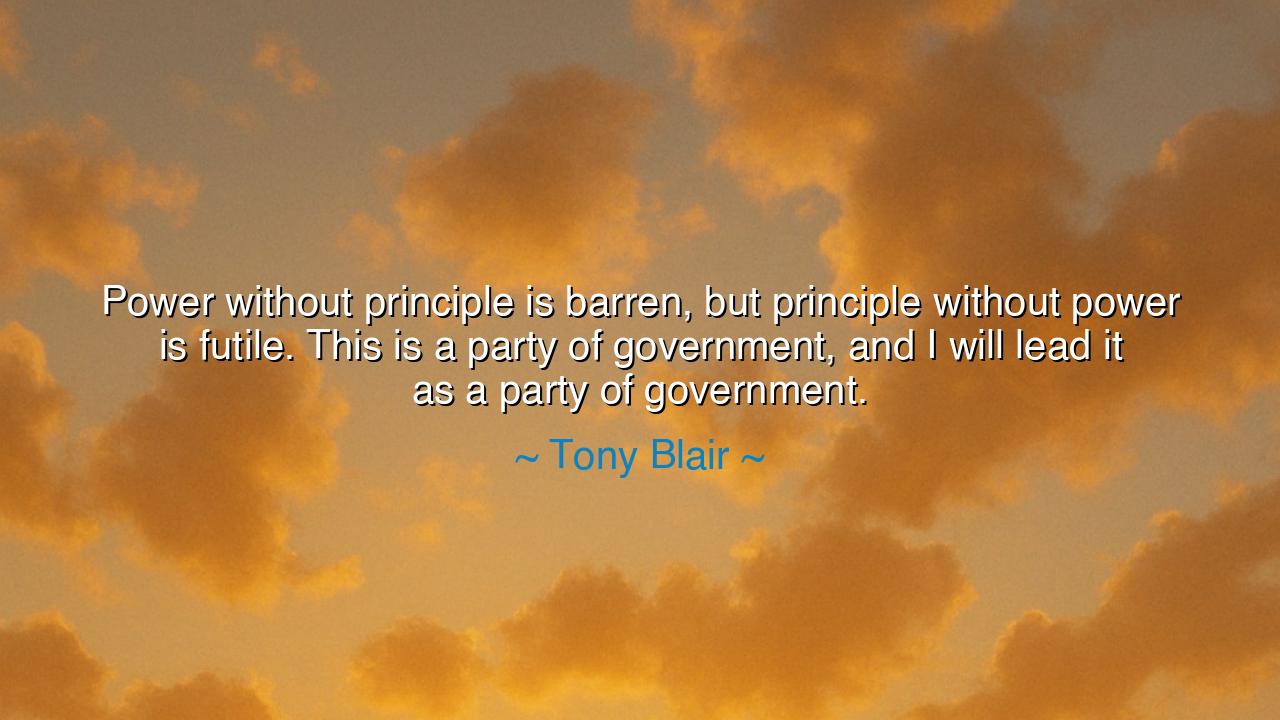
Power without principle is barren, but principle without power is
Power without principle is barren, but principle without power is futile. This is a party of government, and I will lead it as a party of government.






In the halls of politics and the tempests of ambition, the words of Tony Blair ring with the weight of timeless wisdom: “Power without principle is barren, but principle without power is futile. This is a party of government, and I will lead it as a party of government.” Spoken at a moment when his nation hung between cynicism and hope, these words reflect not only the mind of a statesman but the soul of a realist. For they speak of that eternal struggle between idealism and action, between the purity of vision and the responsibility of leadership.
Blair’s statement came in the 1990s, when Britain’s Labour Party—long rich in moral purpose yet poor in political success—stood weary after years of defeat. It was a time when noble intentions filled speeches, but those intentions rarely touched the reins of governance. Blair, seeing this, sought to awaken a new truth within his movement: that principle, unarmed by power, is like light without warmth—beautiful but unable to shape the world it touches. His words were not a surrender to pragmatism, but a call to wed conviction to capability, to give the heart of justice the hands of authority.
The origin of this wisdom is older than the modern age; it is written in the chronicles of every empire and every republic. For history has shown that power without principle leads to corruption, conquest, and ruin, while principle without power leads to impotence, lamentation, and forgotten dreams. The wise have always sought the balance between the two—the sword guided by conscience, the vision steered by reason. This is the essence of leadership: to hold both fire and restraint, and to use one to temper the other.
Consider the story of Marcus Aurelius, the philosopher-king of Rome. He was a man of virtue, yet one entrusted with immense authority. He wrote in his Meditations of the constant struggle to keep his soul untainted by the throne he occupied. Under his rule, justice and order found harmony; his principles gave life to his power, and his power gave weight to his principles. In contrast, look to Robespierre, the revolutionary of France—once guided by high ideals, but consumed by power without humility. His reign began with liberty and ended in terror. Thus the balance broke, and the noble dream of freedom dissolved into blood and tyranny.
Blair’s words echo through such examples, for they are not about politics alone but about the eternal laws of human endeavor. To hold power without moral compass is to wield a blade in darkness—it strikes, but it does not heal. Yet to cling only to principle, refusing to act for fear of compromise, is to watch injustice flourish while standing idle upon the mountain of purity. The wise know that the world is shaped not by those who dream perfectly, but by those who act righteously within imperfection.
And so, when Blair said, “This is a party of government, and I will lead it as a party of government,” he was proclaiming a creed of responsibility. He called his people not to the comfort of protest, but to the burden of rule—to the understanding that change comes not from shouting at power, but from holding it wisely. For governing is not merely commanding others; it is serving with strength, compromising without corruption, and standing firm when convenience whispers surrender.
The lesson is clear and enduring: principle and power must walk hand in hand. If you wield power, let your actions be bound by justice and compassion. If you hold principles, let them guide you not into isolation, but into the world where they can be tested, proven, and made real. Speak not only of what is right—strive to make it law. Dream not only of what should be—labor to bring it to life.
And so, my child of the future, remember this truth as the ancients remembered fire: power without principle consumes, but principle without power fades like smoke in the wind. Seek always the sacred union of the two. Be as the philosopher with a sword—thinking deeply, acting bravely, leading humbly. For in that balance lies the strength to transform nations, and the wisdom to sustain them.






AAdministratorAdministrator
Welcome, honored guests. Please leave a comment, we will respond soon